- Home
- slideshows
- miscellaneous
- The word 'diet' leaves a bad taste in my mouth - but trying the Mediterranean diet for a week completely surprised me
The word 'diet' leaves a bad taste in my mouth - but trying the Mediterranean diet for a week completely surprised me
Day 1: I wasn't hungry.

Day 2: I continued trying new recipes.
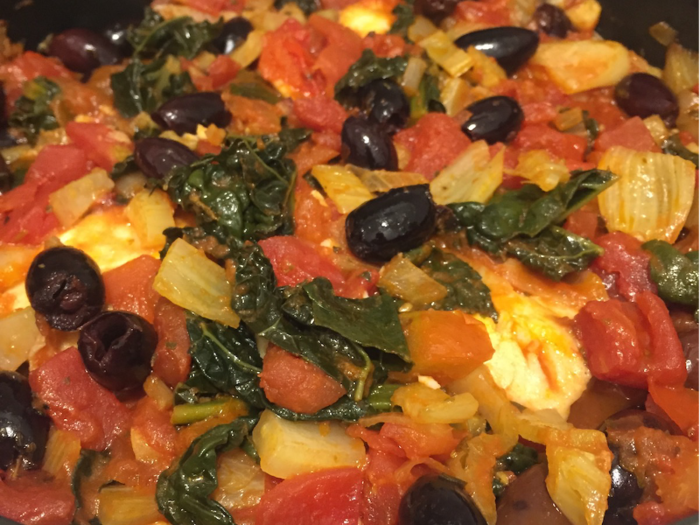
For breakfast, I had a few blueberries before I left for work and some cashews when I got to my desk.
For lunch, I ate roasted zucchini, sweet potatoes, and carrots with farro and a sprinkle of reduced-fat feta.
Come dinnertime, we cooked a modified version of cod with fennel, kale, and black olives, using tilapia instead of cod. It was fun to experiment with ingredients we don't normally use, like fennel. Again, I was amazed to find how full I was by the end of the day.
Day 3: I still didn't feel deprived.
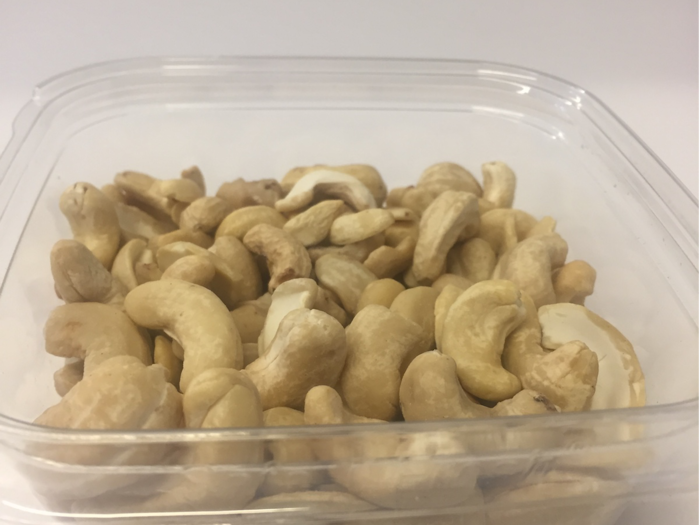
I ate the same breakfast and lunch as I did on Day 2. For dinner, we baked chicken with sundried tomatoes, onions, and a few other ingredients. The dish was simple yet delicious. We also indulged in some whole-grain bread dipped in a mixture of olive oil and red pepper flakes.
Almost halfway into the week, I was expecting to feel deprived, but I didn't. I was eating foods that I truly enjoyed and I wasn't really left wanting for anything.
Day 4: I kept making simple adjustments.
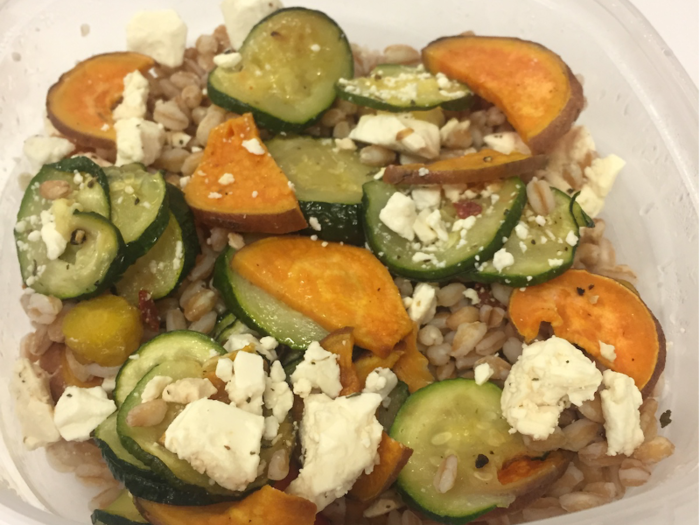
Another day, another breakfast of cashews and blueberries, plus roasted vegetables with farro for lunch.
We made a modified version of one of our favorite meals — a salmon dish — for dinner. We skipped the premade salsa and topped the fish with avocado, cilantro, red onion, and lime juice. We also usually have white rice on the side, but opted for brown rice instead.
So far, it hadn't been difficult to adapt my typical eating style to the Mediterranean diet.
Day 5: I'd grown used to the diet.
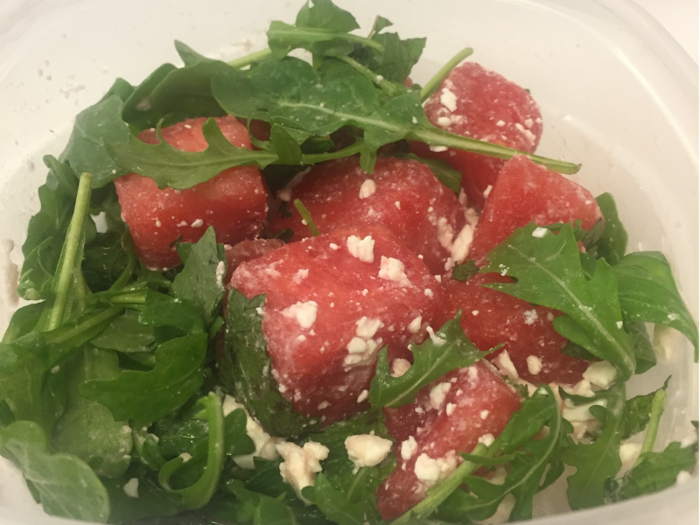
I ate — you guessed it — blueberries and cashews for breakfast. For lunch, I went back to watermelon salad.
We had an easy pasta salad with whole-wheat fusilli, tomatoes, cucumbers, red onions, spinach, and reduced-fat feta for dinner. While I normally make pasta salad with premade Italian dressing, we went with olive oil and balsamic vinegar to avoid unnecessary additives.
I worried that the days I skipped meat altogether would leave me less than satiated. The Mediterranean diet proved that plant-based meals can be satisfying, too.
Day 6: I was sick of cooking.
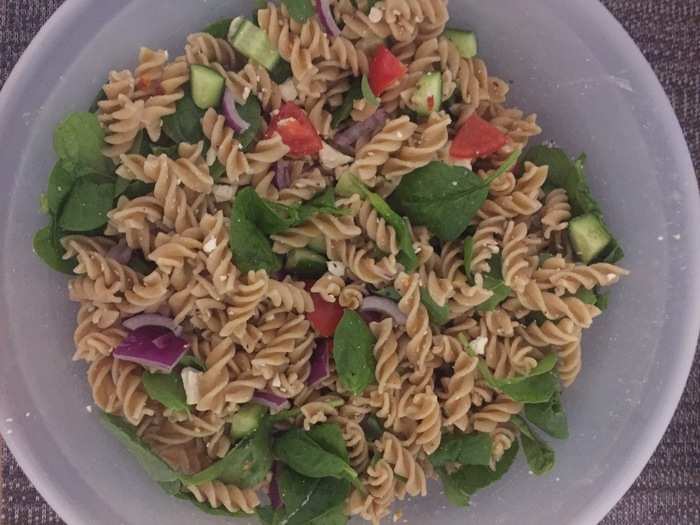
I skipped breakfast and ate leftover pasta salad for lunch.
While my boyfriend and I enjoy cooking and we make the majority of our meals, we go out to eat a few times a week. By Day 6, we were ready for a break from cooking. So, we stopped by Naya, a Middle Eastern fast-food chain.
I ordered a bowl with freekeh, chicken shish taouk, the restaurant's spicy red sauce, and a mix of vegetables. It was nice to know I could pick something up without really straying from my regimen.
We treated ourselves to a glass of red wine after dinner.
Day 7: I passed my final judgment.
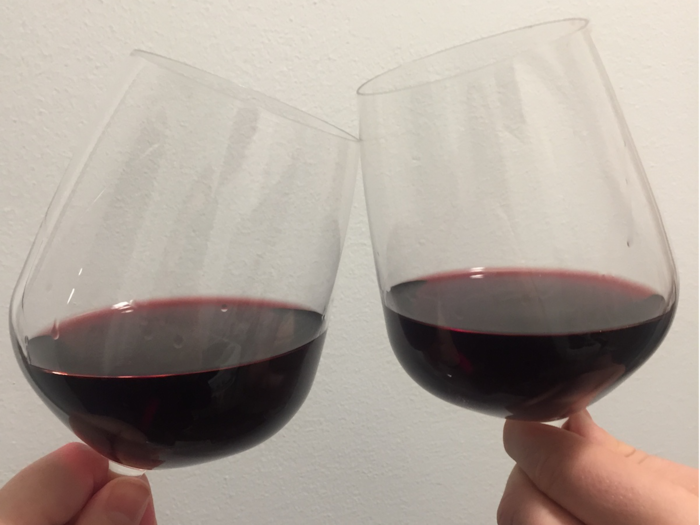
We grabbed bagels with cream cheese on Sunday morning, which probably wasn't the best choice. My everything bagel was whole wheat, though, and I topped it with a low-fat scallion spread. Unlike with other diets, I didn't feel as guilty improvising a meal out. That's probably because the Mediterranean diet doesn't outright ban any foods.
We had a late breakfast so we didn't eat again until dinner. My boyfriend took charge of the meal, serving pan-cooked chicken in whole-wheat pita wraps with cucumbers and tzatziki sauce.
I assumed that by Day 7, I'd be excited to finish the challenge, but really, things hadn't been hard at all. I had to spend more time planning my meals, but that's standard with any diet change.
I didn't notice a difference in my depression symptoms, but the trial period was admittedly short. I also didn't save money on food — my boyfriend and I spent about the same as we usually do in a week. That being said, I did lose two pounds, without changing any other part of my routine.
This might have been because we hadn't added salt to any of our home-cooked meals — the Mediterranean diet involves using seasonings like herbs instead. Research has found that a diet high in salt may make us want to eat more, as Business Insider previously reported.
Above all else, it was easy to maintain, which is a major plus in my book. So easy, in fact, that I’ll continue loosely following the meal plan. For example, I’ll keep buying whole-grain pasta instead of regular pasta — I thought it tasted just as good.
Popular Right Now
Popular Keywords
Advertisement